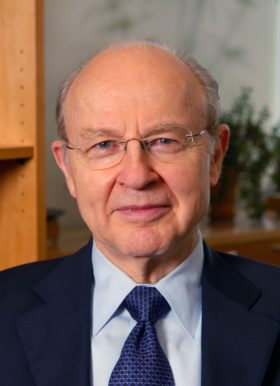
Robert G. Roeder
If DNA is the library of life, and the genes contained within DNA are books, Robert G. Roeder’s scientific accomplishments have played pivotal roles in unveiling the library staff — the hundreds of molecules that determine when the books are read. Roeder received an honorary doctor of science degree in 2005.
These molecules are the primary mechanisms that turn genes on and off, controlling when and where information is read from DNA and put to use in the body. Selectively activating genes is essential to many important biological processes.
The senior member of this metaphorical library staff is an enzyme known as RNA polymerase. In 1969, Roeder, PhD, discovered and described the structures of three versions of this molecule.
Largely through a new technique for studying gene activation that he developed, Roeder has also revealed multiple intricate networks of many different molecules that can bind to or otherwise interact with DNA, RNA polymerase, and each other to control the activities of families of genes.
The basic knowledge Roeder has gathered has enormous potential for clinical benefit in fields ranging from cancer to genetic disorders to infectious diseases.
Roeder was a member of the biochemistry faculty at the Washington University School of Medicine from 1971-1982, for a time serving as the James S. McDonnell Professor of Biochemistry. He joined the Rockefeller University faculty in 1982.
Roeder’s many honors include the 2003 Lasker Award for Basic Medical Research, a prize informally known to many as the “American Nobel.”